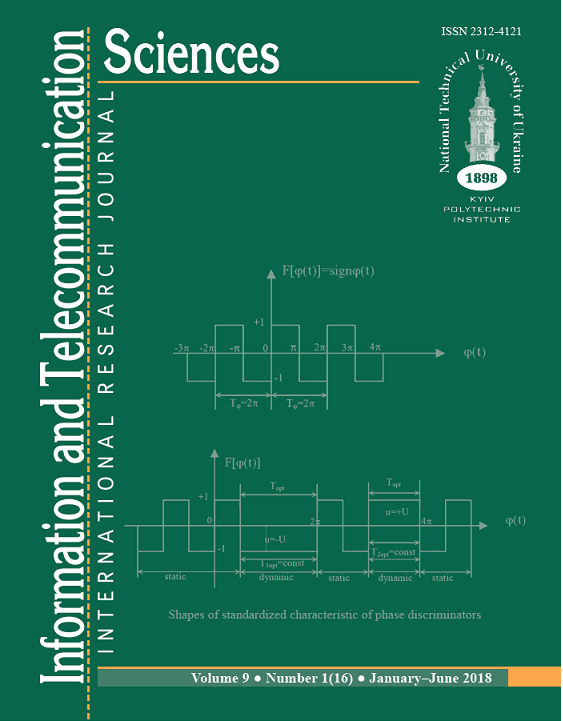DETECTION OF UNKNOWN SIGNALS IN COGNITIVE RADIO NETWORKS
DOI:
https://doi.org/10.20535/2411-2976.12018.5-10Keywords:
cognitive radio, methods of signal detection, unknown radio signals, radio monitoring, radio spectrum, frequency resource, unknown signals.Abstract
Background. At this stage of the development of wireless technologies, there is a rapid growth in the volume of information services, as well as the speed of information transfer. To meet these needs, additional frequency bands should be
used. However, at the moment most of the radio spectrum is already occupied for use. To solve this problem, the concept of cognitive radio can be used, the effectiveness of which mostly depends on the algorithms for detecting signals in frequency channels.
Objective. The aim of the work is to investigate algorithms for detecting unknown signals during radio monitoring in cognitive radio networks.
Methods. Investigation of algorithms for detecting unknown signals was carried out by the method of statistical tests.
Results. The quality of detection of unknown signals is investigated. The proposed detection algorithms should increase the detection efficiency of unoccupied frequency channels, and thereby improve the functioning of cognitive radio networks.
Conclusions. The work deals with nonclassical methods of detecting unknown signals, the application of which is possible within the framework of the concept of cognitive radio. These methods differ from the classical ones in that they use
information only about noise. As a result of computer research, estimates of the detection quality of unknown signals were obtained. These estimates confirm the operability and the possibility of using the proposed algorithms in radio monitoring in cognitive radio networks.
Keywords: cognitive radio; methods of signal detection; unknown radio signals; radio monitoring; radio spectrum; frequency resource; unknown signals.
References
Register of assignments of radio frequencies (centralized assignments) [Electronic resource] // UCRF - Access mode: http://www.ucrf.gov.ua/
Ž. Tabaković, "A Survey of Cognitive Radio Systems" [Electronic resource] // A Survey of Cognitive Radio Systems – Access mode:
https://www.fer.hr/_download/repository/KDI_Tabakovic_Ze ljko.pdf
B. Wild, K. Ramchandran, "Detecting Primary Receivers for Cognitive Radio Applications", in Proc. of IEEE International Symposium on New Frontiers in Dynamic Spectrum Access Networks (DySPAN 2005), pp. 124-130.
S. Haykin, "Cognitive Radio: Brain-empowered Wireless Communications", IEEE Journal on Selected Areas in Commun., Vol. 23, No. 2, February 2005, pp. 201-220.
D. Cabriс, S. M. Mishra and R. Brodersen, "Implementation Issues in Spectrum Sensing for Cognitive Radios", Conference Record of the 38th Conference on Signals, Systems and Computers, November 2004, pp.
-776.
S. M. Mishra, A. Sahai and R. Brodersen, "Cooperative Sensing Among Cognitive Radios", in Proc. of IEEE International Conference (ICC 2006), June 2006, pp. 1658-1663.
Theory of signal detection / P.S. Akimov, P.A. Bakut, V.A. Bogdanovich et al .; Ed. P.A. Bakuta. M .: Radio and Communication, 1984. 440 p.
Omelchenko, V.A. Fundamentals of the spectral theory of signal recognition. - Kharkov: High school, 1983. - 156s.
Bezruk V.M., Pevtsov G.V. Theoretical bases of designing systems for recognition of signals for automated radio control. - Kharkov: Collegium, 2007. - 430 p.
SDR And CR Boost Wireless Communications // www.electronicdesign.com.
Downloads
Published
How to Cite
Issue
Section
License
The ownership of copyright remains with the Authors.
Authors may use their own material in other publications provided that the Journal is acknowledged as the original place of publication and National Technical University of Ukraine “Igor Sikorsky Kyiv Polytechnic Institute” as the Publisher.
ITS articles are published under Creative Commons licence:
- Authors retain copyright and grant the journal right of first publication with the work simultaneously licensed under CC BY 4.0that allows others to share the work with an acknowledgement of the work's authorship and initial publication in this journal.
- Authors are able to enter into separate, additional contractual arrangements for the non-exclusive distribution of the journal's published version of the work (e.g., post it to an institutional repository or publish it in a book), with an acknowledgement of its initial publication in this journal.
- Authors are permitted and encouraged to post their work online (e.g., in institutional repositories or on their website) prior to and during the submission process, as it can lead to productive exchanges, as well as earlier and greater citation of published work.

